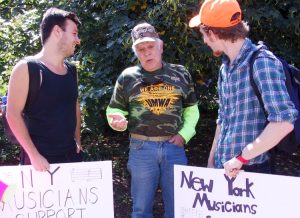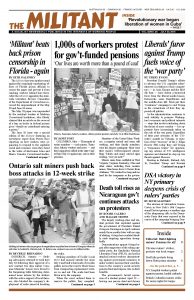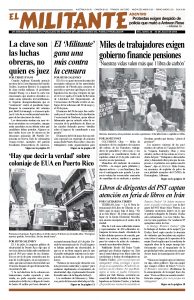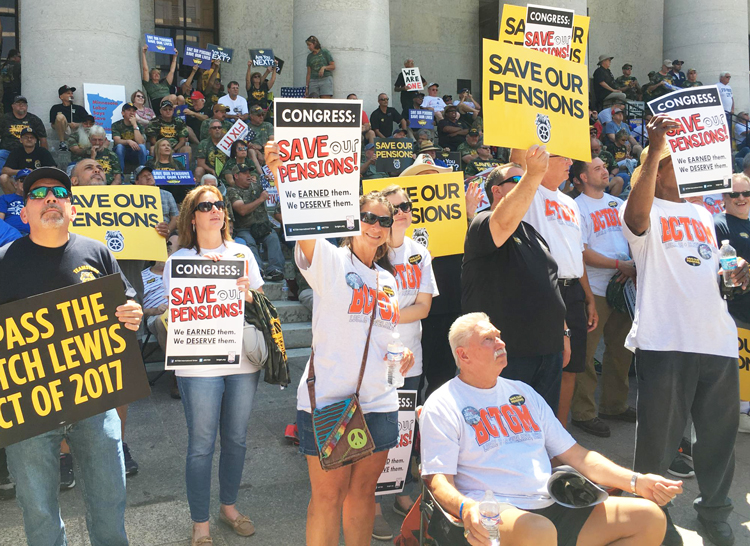COLUMBUS, Ohio — Thousands of union members — coal miners, Teamsters, bakery workers and more — and their supporters rallied at the state Capitol here July 12 against any cuts in their pensions.
Members of the United Mine Workers, a majority retired and some still working, and their family members, were the largest contingent. Most wore their union’s well-recognized camouflage T-shirts and many carried signs reading, “Are you next?”
Miners came from coalfields in West Virginia, Virginia, Kentucky, Ohio and other states, including from western mines. Nine buses drove 12 hours from Alabama. “We worked too long and too hard for the companies or the government to take our money,” Mike Foster, a retired UMW rock duster mechanic from Birmingham, told the Militant.
The workers are demanding the government fund full pensions for hundreds of thousands whose pension plans are on the brink of bankruptcy. Roughly 1.3 million U.S. workers are in a pension plan headed toward insolvency.
The largest of these is the Teamsters Central States Pension Fund, with a liability of $17.2 billion. Thousands of Teamsters came to the rally, with signs saying, “Save Our Pensions.”

Among the unions present were the UMW; Teamsters; Bakery, Confectionery, Tobacco Workers and Grain Millers; American Federation of Musicians; United Steelworkers; Iron Workers; Communications Workers of America; American Federation of State, County and Municipal Employees; United Food and Commercial Workers; Brotherhood of Maintenance of Way division of the Teamsters; and teachers from Atlanta; Buffalo, New York; and Raleigh, North Carolina.
Earlier this year tens of thousands of teachers went on strike and protested, pushing back government attacks on their wages, pensions, medical care and working conditions. Their spirited actions inspired workers everywhere.
“I came here to support the miners. If they take pensions away from one, they will take them from us all,” said Richard Griffin, a bread-line worker from Indianapolis.
The current average miner’s pension is only $586 per month. The UMW 1974 Pension Plan is expected to go bust by 2022, sooner if the capitalist economy goes south. It covers 87,000 retired and 20,000 working miners. For plans that collapse, workers can possibly get some coverage under the federal government’s Pension Benefit Guarantee Corporation plan — but it would slash their benefits and that fund is facing bankruptcy.
Jan Kachur, a retired Teamster from Deerfield, Michigan, said he had worked nine jobs to get the 28 years required for his pension. It took him 35 years, because not all the jobs were full time. “You’d get a job, it would go bankrupt — you followed the pension,” he said. His story illustrates the challenges of a retirement system based on the fortunes and profits of your bosses and kept alive on speculation in the stock market.
Over the last couple decades, as capitalist profit rates, production and trade declined, many mine and trucking bosses either went under or tried to break the unions, wreaking havoc with workers’ industry-based pension plans.
‘Retirement was a promise’
“When I was younger I always paid my money toward retirement because they said it was a promise, and I believed them,” said Glenn Hanson, a city bus driver in Duluth, Minnesota, who retired after 30 years. “My wife and I budgeted for the $2,700 pension. If I get cut I don’t know what we’ll do.”
“Workers still have power in the U.S., we just don’t use it,” he added.
“After World War II and the giant miners’ strike, [then union president] John L. Lewis signed an agreement for retirement benefits for all miners, promised for all time,” said Joseph Hatfield, president of a UMW local near Matewan, West Virginia. “And that’s what we counted on every day we worked.”
This led to a discussion on why this is not only a fight to defend miners’ pensions, but a broad social crisis that workers face under capitalism. Why there must be government-funded union scale compensation for all workers who retire or lose their job, no matter why or at what age. This is a fight the unions must lead and that would draw millions in and point the road toward taking power out of the hands of the capitalist exploiters.
That’s what the bosses fear and why their attacks on wages, safety and working conditions are intertwined with assaults on social gains, such as Social Security, Medicare, Medicaid, disability payments and pensions, inadequate as they are. They try to divide us by convincing young workers that they have no stake in the welfare of older workers.
“This is a fight for the younger generation so they won’t lose what we fought hard to gain,” Pete Lomonaco, a member of Teamsters Local 727 in Atlanta for 37 years, told Malcolm Jarrett, a cook from Pittsburgh who was showing him the Militant.
Bryant Taylor, a long-haul truck driver from Cleveland, discussed the health care crisis with 23-year-old musician Dean Mahoney, who took a break from his band’s touring schedule to attend the protest. “Whether you work at McDonald’s or Ford Motor you should have full heath care,” Taylor told him. Mahoney said he has no health care benefits. He was shocked when he saw an ad pop up on his Facebook page urging him to “donate your blood to make money.”
Jacquie Henderson, a Walmart worker and member of the Socialist Workers Party who came on a Teamsters bus from Duluth, carried a sign reading, “Minnesota Walmart workers support fight for retirement pensions for all workers!” It included 11 messages of solidarity from her co-workers. Seeing the sign, Sharon Wilson from Beaver Dam, Kentucky, greeted Henderson, “Do you work at Walmart? I do, too! We need a union!”
Wilson, who has worked at Walmart for 13 years, is the widow of a UMW miner with two sons who work in nonunion mines. She got a subscription to the Militant and the two workers traded contact information to keep in touch.
“Human beings’ lives are worth more than a pound of coal,” John Snider, a retired union miner from St. Clairesville, Ohio, told the Militant. “We have to be together. It’s that or we are done.”
Malcolm Jarrett, Alyson Kennedy, Helen Myers, and Sarah Ullman contributed to this article.


